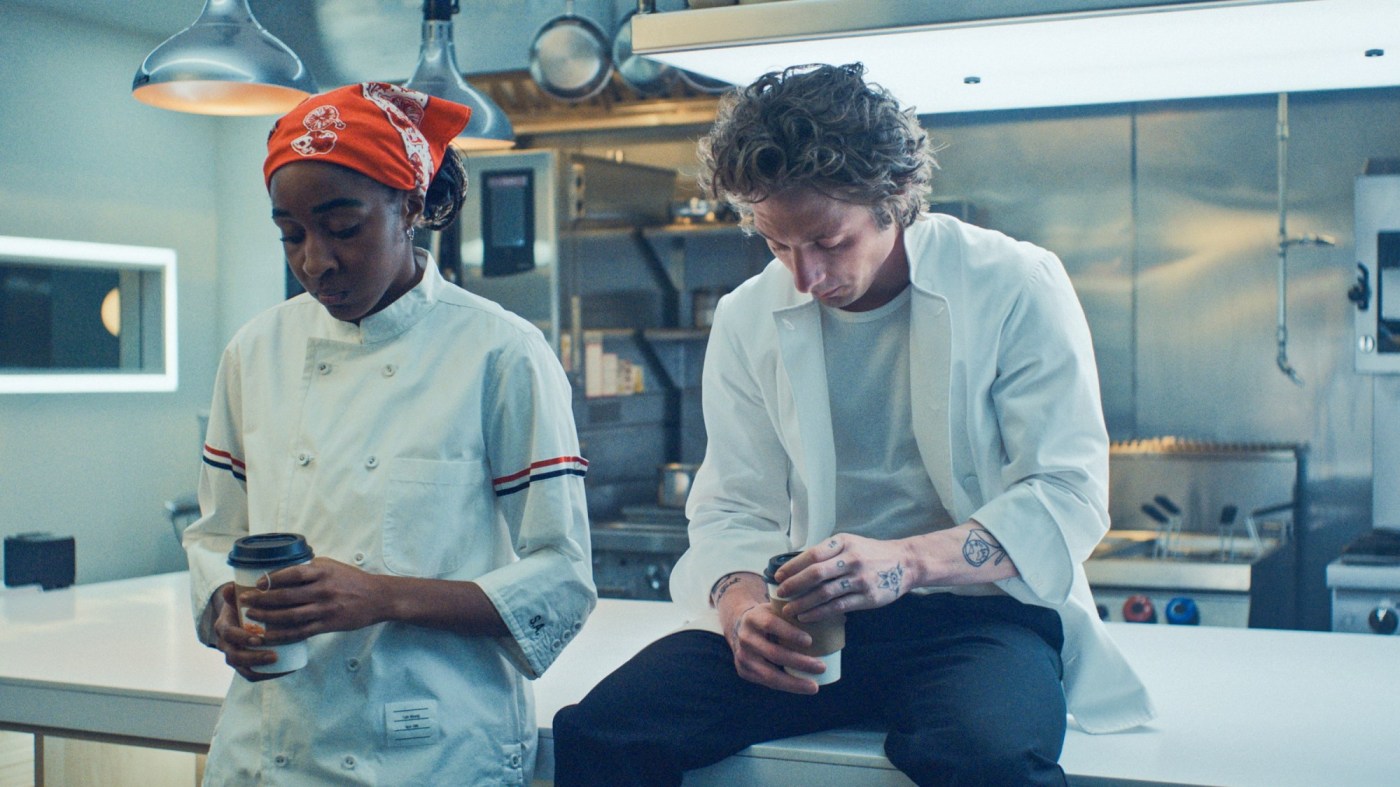
Column: Class and social status in the kitchen and ‘The Bear’
“The Bear” is the story of a workaday Chicago sandwich joint switching gears to become a fine dining establishment. But restaurant kitchens of all types are an ecosystem where class issues play out. It’s a hierarchy that inevitably says something about social status. How well — or not — does “The Bear” tackle these themes?
Tribune TV critic Nina Metz talks with the Tribune’s dining team; the following has been edited for length and clarity.
Food critic Louisa Kung Liu Chu grew up in her family’s restaurant on Chicago’s Northwest Side and is a graduate of Le Cordon Bleu Paris. While in Paris, she worked at the restaurant Les Ambassadeurs. She has also spent time in the kitchens of Alinea and El Bulli, among others, and was nominated twice for a James Beard Award for her restaurant criticism at the Tribune. (In an earlier life, she was a fixer for Anthony Bourdain’s “No Reservations” TV series.)
Food reporter Ahmed Ali Akbar joined the Tribune this year with a wide range of experience in audio, culture and food writing. He began covering American Muslim food culture at BuzzFeed and BuzzFeed News a decade ago and has written mostly about halal and immigrant-owned businesses. He won a James Beard Award for feature reporting in 2022.
Nina: The Berzattos & Co. are working class, but Carmy’s professional achievements have put him on a different plane. That got me thinking more generally: Even though some chefs have formal training, it’s not a precondition. Working at a high-end restaurant may be one of the few jobs with status and prestige that doesn’t require academic credentials. Are kitchens a rare meritocracy where a path for class mobility exists … or is it more complicated than that?
Louisa: Much more complicated! It depends on where, as in what country, but generally speaking it should come as no surprise that I was one of the few women cooking in world-class kitchens, and one of the fewer people of color. And even now as a critic, where I carefully consider questions of equity and justice, it’s still hard to find fine dining restaurants run by diverse chefs. And that’s not for a lack of merit, but opportunity and privilege.
Ahmed: As a reporter, what I know well is family-owned halal restaurants that have little to no interest in fine dining. In that smaller slice of expertise, the kitchen isn’t really a meritocracy where you can rise up the ranks by skill. In my experience reporting on restaurants that are more similar to The Bear, many chefs/owners are starting to understand they need to acknowledge their cooking staff’s contribution to the menus, at least. Importantly, there’s a clear division between ownership and labor.
Nina: Louisa, in economic terms, do you think chefs at this level come from a variety of backgrounds? Do chefs from upper middle class or wealthy families have a leg up in this world?
Louisa: Some variety of socioeconomic backgrounds, but not much. I mean, it costs real cash money to be able to travel around the world to work or stage for no or low pay. Or live in a big city or remote area, where there’s a destination restaurant. And upper-middle-class or wealthy families or high-net-worth individuals themselves always have a leg up in this world, as we know! It’s not always as evident when you’re all wearing the same uniforms and doing the same work. Not until your chef friends invite you to visit them at their parents’ villas.
Nina: I think the show is hit-and-miss when it comes to thinking about class issues and credentialism. I really liked the episode this season that reveals how Tina came to work at The Original Beef of Chicagoland. Despite her real-world experience, she keeps running into one brick wall after another on her job hunt because she doesn’t have a college degree. Whereas Mikey doesn’t even bother to look at her resume! What did you guys think of that storyline and how it tackles some of these ideas?
Ahmed: I enjoyed that episode too — and not just because Tina is almost definitely my neighbor! I wondered if that scene felt unrealistic to people, but I absolutely think the kind of random connections that Mikey and Tina have are possible at restaurants. Getting hired is not really a matter of a resume — you need to demonstrate that you work hard, can show up on time and can take care of yourself and she does that right away.
While Tina is Puerto Rican, that story reflects a common trend about the back-of-house I’ve seen in my reporting on immigrant-owned restaurants. The front-of-house might be Pakistani or Lebanese or Italian but head into the kitchen and the chef is Mexican, who learned the recipes from their bosses. Those contributions may not always be acknowledged or compensated fairly.
Louisa: I loved that episode about Tina with Mikey, directed by Ayo Edebiri (who plays Sydney)! But that storyline was so unfortunately out of touch with reality and strangely divisive. The idea that she could help support herself and her husband and their son with a rent hike on what Mikey paid her to cook at The Beef is a nice idea, but unrealistic. It just felt like it was written by and for people who have never done that kind of work and needed to support themselves and their families with that pay. Like we can all just survive on vibes.
Related Articles
Why these 10 American anthems deserve a spot on your Fourth of July playlist
Oakdale Summerfest to feature pop-up splash pad and fireworks show
16 LGBTQ+ love stories to stream during Pride Month and beyond
How to host your own “Hot Ones” party: Tips from fire-breathing experts
‘A Quiet Place: Day One’ review: Lupita Nyong’o can’t save the world, but she saves the movie
Nina: I want to talk about how “The Bear,” as a show, mirrors the stratification that exists inside restaurants. Is this often racialized? A lot of time is spent on Carmy. A bit less on Sydney and Carmy’s friends and family. And while Tina was the focus of her own episode, other employees have been given short shrift in each of the three seasons, whether it’s Sweeps (who was suddenly informed he is now supposed to be a wine expert) or Ebraheim, who is put in charge of the Italian beef takeout window (which feels like an afterthought for Carmy; a begrudging “fine” to the regulars who demanded the place still offer up lunchtime sandwiches). How accurate did that feel to both of you — and what are your thoughts about who the show decides gets multi-dimensional storylines that go beyond a short scene or two?
Louisa: Yes, it’s often racialized, by accident or design. But I just want to mention nationality here, because I found it so hard to believe that there was not one person of Mexican origin or descent working in the kitchen, because that’s an important demographic in the hospitality industry in this country, as Ahmed said too. And as far as feelings on accuracy and thoughts about who should have more of their story told, I’m sorry, but I could do with fewer fuzzy flashbacks of Claire and would like to at least know Ebra’s last name since his sandwich window is carrying the restaurant right now.
Ahmed: I will say that I love pretty much every character in that kitchen and I want more of them all.
I’ll answer your question another way — to me, the pilot was the best episode, where it’s about multilayered power dynamics and the long-term trauma of everyone in the kitchen. It’s about Carmy’s big head trying to fit itself in that small kitchen and every individual having their own reasons for resisting him. But ultimately, they can’t, because he owns the place.
Now we’re in Season 3 and everyone has basically accepted Carmy’s fine dining vision, except Ebra. If we’re in Carmy’s head, then that’s a potent metaphor. But Season 3 basically resolves Ebraheim’s unfair situation by simply … giving him more help in the kitchen.
I agree that we spent too much time in flashbacks and not enough time exploring everyone’s new relationship with their new work, especially the characters of color.
Louisa, if I can ask you a question, what did you make of Tina’s embrace of fine dining even as she struggled with it on a technical level? I get it with Marcus, who is a young hungry sponge, but I was surprised to see Tina was so OK with obsessing over menu items that were judged by Carmy’s “genius.” And notably, she presumably could not afford herself!
Louisa: I think Tina embraced fine dining because she is a woman who clearly wants more for herself and her family. And she’s connected to food. We see that with the lunches she packs and the crockpot dinners she preps every morning. And I so get her, as a woman who didn’t start working in the best restaurants in the world until I was in my 30s and 40s myself. And I think she sees in Carmy‘s work not necessarily genius or status, but beauty in his craft to take us someplace else.
Ahmed: Right. That’s the meritocracy thing that might be offered by the swap to The Bear and Carmy sending her to culinary school. He bought a lot of good will with that and by offering everyone professional development. Whether that promise is still on the table and the level to which Tina, Marcus and Ebra are benefitting is an unanswered question in Season 3.
Nina: Let me go off on a quick tangent: One of my critiques of a show like HBO’s “The White Lotus” is that it’s not an effective satire because it has no interest in the experiences and (likely scathing) point of view of the people who do all the manual labor that keeps these five-star resorts in pristine condition. The housekeeping staff see everything (and are tasked with cleaning it) and they are often treated as invisible — or worse. (“The Chambermaid,” which was Mexico’s 2019 Oscar submission, is a great corrective.)
To that same end, I was curious about the dishwashers at The Bear. Who are they? What are their stories? Are they new hires or holdovers from The Beef? What do they make of all the shouting in the kitchen? (Maybe they don’t care about any of the drama!) I’m curious about all the facets needed to run a restaurant, so I’m interested in other things beyond the “sexier” work of devising these intricate menus. Do dishwashers ever socialize with kitchen staff, or is there a pretty clear class line dividing them? Where does the waitstaff fall in terms of status at a restaurant like this?
Ahmed: I also want to learn more about them! It’s a bit hard to say with any broad generality, but I’d certainly want to know how this particular set of dishwashers relates to the rest of the staff. In my experience, you’d get some of the most interesting stories about restaurants and the industry speaking with dishwashers, cashiers and other behind-the-scenes workers.
The show is torn between its interest in workplace dramedy and character study on grief and family. I miss longer seasons of TV where those characters could be breakouts if they had more space.
Louisa: Again, it depends on where. In the extremely fine dining kitchens where I worked in Paris and Spain, dishwashers had their own social circles, and did not really socialize with the cooks. There was a pretty clear class line, but maybe not what you might expect, because a lot of them were men who told me about their families and the houses they were building back in their home countries. And there’s still often a front-of-the-house and back-of-the-house divide in this country, largely due to tipping, where some servers can make six figures in the same steakhouse where cooks barely make enough to survive.
FX’s “The Bear” streams on Hulu.


